#rama birth place
Explore tagged Tumblr posts
Text
family dynamics.
– Varadha –
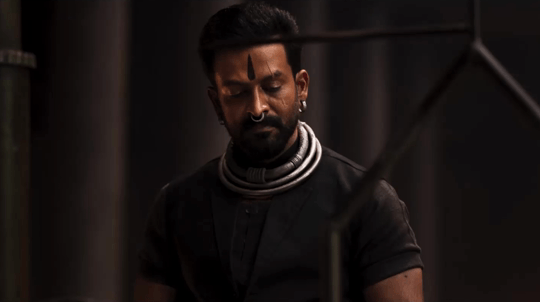
Varadha is a wildcat among rabid dogs. He is no less capable of violence or twisted games, but he operates from a completely different wavelength, which is his biggest strength.

Rudra is a typical bully. He is someone who, from childhood, has always teamed up against the minority in an effort to seem powerful, because he cares too much about perception and not enough about true value
so it makes sense, that he’d find validation in treating Varadha – a stepbrother who is so far removed from how people normally behave in Khansaar – condescendingly.
he is specifically envious of Varadha – most of the hate Rudra feels for Varadha stems from an insecure desire to elevate his own worth.
but Radha Rama?
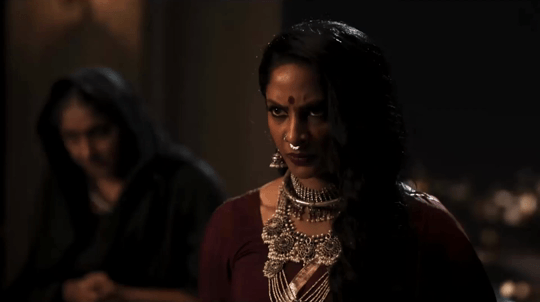
why does she hate Varadha? – she's above Rudra's pettiness and definitely knows better than to waste her time and energy on power plays when she could work on herself.
but we know that she's hated Varadha since his birth – even more than Rudra does, in fact.

It must have started out as sibling rivalry, especially with how eager Radha Rama is for Rajamannar's approval. Varadha, ever since his birth, was probably a threat for that spot – was possibly even Rajamannar's favorite before he gave away his honor territory. and after that? the hatred only grew. We know that once Varadha lost his position as a lord, he was shunned from court, and he spent more time among the people of Khansaar than his family. and this gave him more exposure throughout Khansaar and definitely earned him a particular reputation for how level-headed, clever, and genuine he was.
it slowly became more and more obvious, (to Radha Rama especially) as Varadha grew older, that he inspired devotion in people – he had people that would die for him, and she could never understand how he'd done it, especially with how hard she'd worked to be seen as valuable.
so it frustrated her that Varadha, even with his inherent, deliberate softness, and the way he portrayed himself, was able to receive such love and warmth from the people who knew him personally, and that maybe played a part in how much more she worked for the approval of Khansaar's king:
Rajamannar.

Rajamannar is someone who definitely saw the soft power Varadha had for winning hearts, especially with his coexisting capability for exerting his own power.

It takes a diplomatic, yet terrifyingly strong man, to build and maintain an empire, and obviously, this is something that even Rajamannar was unable to do perfectly, with his need to annihilate an entire tribe to secure the throne for himself.
Shivamannar was the first and only to be capable of doing this, and Rajamannar sees that same strength, tenacity, and authenticity in Varadha. As a father, he was definitely proud of Varadha in the beginning and could see his capacity for greatness.
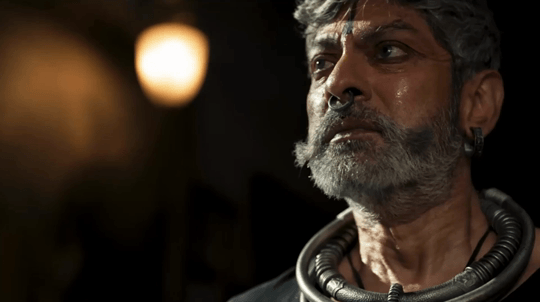
After Varadha disappointed him by giving away his kada, though, Rajamannar still cared for him and saw his potential, but could no longer publically support a son who had disregarded their honor & disrespected not only the territory but also Rajamannar's decision to put him in charge of that territory – especially since Varadha refused to tell him why he did it.
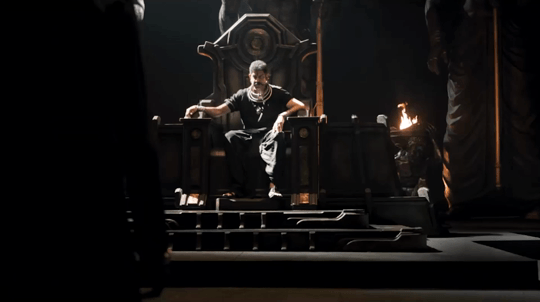
and now that Rajamannar, just like Radha Rama, has realized the extent of Varadha's quiet power, most of his pride has turned to wariness.
because as a father, he can be proud.
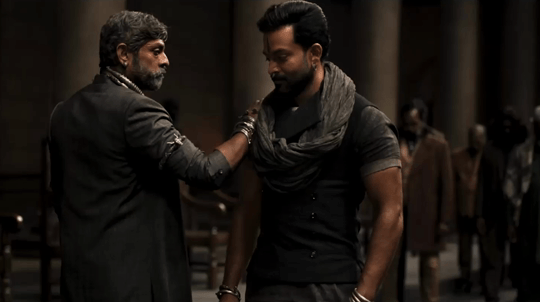
but as a king?
Varadha is a threat.
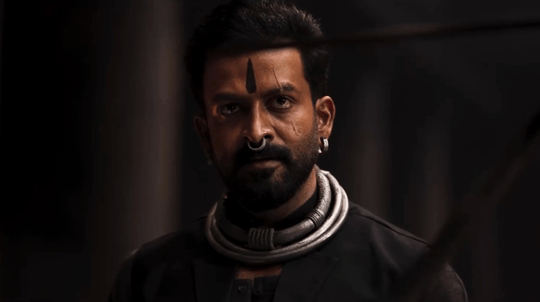
Which leads us to the fact that: Rajamannar, Rudra, and Radha Rama have been hostile to the one person who has the capacity and the qualities to rule, but wouldn't have actively sought out the throne if they hadn't placed him in a spot where the only way for him to attain respect and feel valued was to gain the throne.
Essentially, by treating him they way they have, in an effort to keep him away from court and in fear that he will surpass them, they've dug their own graves.
— love, a definition: part two [part one / part three]
#what's that quote about meeting your destiny on the road you take to avoid it?#radha rama understands varadha – and knows that the best way to get to him isn't to threaten him – but his loved ones#headcanon that varadha tried many times in childhood to befriend radha rama. but it never worked because she was unreceptive#love. a definition#part two#salaar#varadha rajamannar
105 notes
·
View notes
Note
Hi dear. Thank you for your lovely answers. May you please write something really angsty on Uttarkand about Sita and Ram along with a short resolution. Thanks again.
Hello! Thank you for the ask, here you go! I hope you like reading this:
1.
He learns it in the morning. It is bare five minutes past breakfast, five minutes since Sita put her arms around his neck and offered him pieces of chopped areca, five minutes of missing the sweetest woman in all the three worlds. Five minutes till his life is uprooted once more, like that fateful day so many years ago.
“Forgive me, My King,” says the messenger. He bows low, shoulders bent close to his hip. He is also quivering, for who would not when given the unenviable task of speaking to the king of the dishonor of a wife so dearly loved?
Rama turns away from the man. He is a god, even unawares, his Queen divine and divine-born. What should the complaints of mortal men mean to them? And yet so it does, as it did to his father, and their fathers before him. And so Rama, well-read in Dharma and the duties of Kings, bends his godly head to the whims of a washerman.
“So be it,” he says.
By the end of the night, Ayodhya’s royal family is in tatters. The most loyal of brothers spends his night howling at the king, deeming his orders an injustice. The most virtuous of wives sees the morning sun through the eaves of the forest, and the childing mother weeps.
2.
Koushalya has never been anything less than selflessly kind – and Rama has never shied away from making use of it. So he did when Dasharatha sent her only son away, so he did when Sita left her bereft of a daughter in her old age, and so he did when he refused to go with Bharata and dashed her hopes of a loving reunion. And Koushalya, who has never sought any joy for herself, Koushalya, daughter of Kosala – the greed for which kingdom is the root of all ills – bent her head to wills of her son and her daughter and her king, and asked no more.
Perhaps that is why Rama is so surprised when she insists on him remarrying. Why does she not understand that he cannot love another woman the same way she could never love any man other than Dasharatha?
“That is not true,” his mother says. “I learned to love your father out of duty, as he did as well. So too will you.”
“That is a terrible thing to say.”
“It is not, Rama. Not every man has beheld his bride in a fragrant garden, not every woman has walked the length and breadth of Aryavarta for her exiled groom. Most of us wedded in duty, for the king and kingdom that fed us and named us daughter and queen. It makes our love and loss no less. Such is the nature of things. So I have stood beside your late father with two sister-wives, and so I have held my Kosala close and dear, and loved her as I have loved you all. And so you shall now as well, for the kingdom that names you King.”
Rama hears this long speech and hears her interspersed sighs. He is King – by virtue of his birth and his mother’s as well – and a hundred thousand men in Ayodhya alone send him tribute for it. His raiment is ever sparkling and yellow-gold, his table groans under food. All men exalt him, from the foot of the mountains to the tip of seas, more than they even do Indra, King of Gods – is his loss of love not meagre payment?
And Rama, god-king, turns away and bows. “So be it,” he says and bends his head.
By noon, a sculptor is summoned, a hundred ingots of gold collected, and a thousand golden coins offered. By the time the fires of the Ashwamedha Yajna is lit, the Queen’s empty place at Rama’s side is filled by a golden mockery of the greatest woman on Aryavart.
3.
Sita of the forest is much changed, and yet she is still the same. Before her hermit’s attire Rama and his silks appear cheap; her garlands of flowers make mockery of his gold and jewels. Even Surya, father of Ikshvaku’s Clan, bends his rays around her curves, shamed by the light in her eyes.
Come back, he wants to say, please, come back with me.
And yet Rama is King where Sita is no longer queen, and will never be unless every man in Ayodhya knows of her innocence. Lanka knew, as did Kishkinda, for Rama would not allow any tarnish upon the name of Raghu’s scions. From his own people he had sought more trust, to his own folly.
She looks at him quietly, clutching at wild children who should have known palaces, with tears in eyes that should have never seen such sorrow.
But Rama has bowed his head to the will of his people, has heard their charges and said, “So be it.”
And thus under the eaves of a forest sister to Dandaka, Sita’s chastity is questioned again. And thus, the King strikes the innocent once more, punishing where he should have shielded, being the judge where he should have been the guard, and the ransom for a Queen’s return is named.
+1.
Gentle is the land of Mithila, sweet are her songs. Wise is her sagely King, and blessed are her people. And so she has passed these virtues unto her daughter, as all good mothers do, for the land has borne Sita long before any man could lay claim upon her.
To scorn her is to scorn the loyal, the hapless and the earthbound; to forsake her is to forsake the daughter and the mother and the wife. Kosala, the kingdom that called itself Dasharatha’s for all that Koushalya was its child, has done just that – a land of raving men that seeks to destroy those who have borne and raised them.
Sita has been wife for nigh two decades, is even now a mother. And yet she is woman, and her kin are those with curved hips and gentle hands – beautiful features that would be sought and lusted after like leopards lust for calves. And as the farmer bemoans the trembling calf that strayed from the herd, so too would the world bemoan the women who fall into the jaws of men, would say: why did she not run away, why did she not fight; why did she not slay herself, that now one must doubt her husband’s might?
So, Sita lifts her head where it had been bowed, blinks tears away from her eyes.
“That cannot be,” she tells the King, for no longer is Rama husband and lover, and shakes her head.
“Mother!” she calls. Divine she is, and divine-born, and the earth, her mother, rends apart for her. Her children scream, her once-husband howls. But Sita is no longer mother and wife. It is time for her to be a daughter.
(By noon, Lav-Kusha are motherless where they once had no father, and Kosala is orphaned again. The kingdom laments and wails, but Sita is gone. Forgiveness, even from a goddess lasts only so far. And yet centuries later her tale is still told, for it is a woman’s fate to be bloody, but may she ever be unbowed.)
#hindu mythology#ramayana#ram#rama#ramayan#sita#seeta#valmiki ramayan#hindublr#desiblr#fics#3+1 fics#ask#answered#ask box#hinduism#kaushalya#koushalya#boo writes
26 notes
·
View notes
Text



The Myth of Surya: The Sun God in Hinduism
Introduction: The Sun God in Hinduism
In the vast pantheon of Hindu gods, Surya, the Sun God, holds a prominent position. He is revered as the source of life, energy, and knowledge. His radiant presence illuminates the world, dispelling darkness and ignorance. In Hindu mythology, Surya is a revered deity associated with vitality, radiance, and the cycle of time.
The Birth and Origins of Surya
The origins of Surya are shrouded in mystery and legend. According to one myth, he emerged from the cosmic ocean during the churning of the milky sea by the gods and demons. As the sea churned, fourteen precious objects emerged, including Surya, who rose as a blazing orb of light.
The Chariot of Surya: A Symbol of Radiance and Energy
Surya is often depicted riding a magnificent chariot drawn by seven majestic horses. The chariot represents the Sun's celestial journey across the sky. The horses symbolize the seven days of the week or the seven colors of the rainbow. Their hooves create thunder as they thunder across the heavens, illuminating the world below.
Surya and the Vedas: Hymn of Praise to the Sun
The Vedas, the ancient Hindu scriptures, contain numerous hymns dedicated to Surya. The most famous is the Gayatri Mantra, a sacred incantation recited by Hindus worldwide. The mantra invokes Surya as the remover of darkness and the bestower of knowledge and enlightenment.
The Importance of Surya in Vedic Rituals
In Vedic rituals, Surya is invoked as the witness of all actions and the guardian of truth. He is the deity who oversees oaths, promises, and contracts. His presence is believed to ensure honesty and integrity in human affairs. Surya's importance extends to the realm of astrology, where he is associated with the planet Sun and is considered a beneficent influence.
6. Surya in the Ramayana and Mahabharata
Surya plays a significant role in the two great Hindu epics, the Ramayana and the Mahabharata. In the Ramayana, he is the father of Rama, the hero of the epic. He assists Rama in his battle against the evil demon king Ravana, providing him with guidance and protection. In the Mahabharata, Surya is the father of Karna, one of the most tragic heroes of the epic. Karna is a powerful warrior who fights valiantly but is ultimately defeated due to his tragic destiny.
7. The Myth of Surya and His Wives
Surya's wives are known as Samjna, Chhaya, and Ragyi. Samjna, the daughter of the celestial architect Vishwakarma, is the goddess of twilight. Unable to bear the intensity of Surya's radiance, she creates a shadow form, Chhaya, to take her place. However, Surya discovers the deception and curses Chhaya, causing her son Shani to be born with a malefic gaze. Ragyi, a horse-headed goddess, is the daughter of Hiranyakasipu, the demon king. Surya marries Ragyi out of compassion, but she remains childless.
8. The Symbolism of Surya: Light, Consciousness, and Knowledge
Surya is not only a physical representation of the Sun but also a symbol of light, consciousness, and knowledge. He illuminates the world both physically and spiritually. In Hindu philosophy, Surya represents the inner light of wisdom and knowledge that dispels ignorance and darkness. He is the embodiment of pure consciousness and the source of enlightenment.
9. Surya, the Healer and Protector
Surya is revered as a healer and protector in Hindu tradition. His rays are believed to have healing properties, and he is invoked to cure diseases and ailments. As the guardian of the world, Surya protects against evil forces and ensures the well-being of all living beings. He is often depicted holding a lotus flower, which symbolizes purity, fertility, and the power of creation and destruction.
10. Conclusion: The Enduring Legacy of Surya
The myth of Surya continues to inspire and fascinate people around the world. His story is a testament to the power of light and knowledge in overcoming darkness and ignorance. As the Sun God, Surya remains an eternal symbol of hope, renewal, and the enduring cycle of life. His legacy lives on through countless temples, festivals, and rituals dedicated to his worship in India and beyond.
Surya by Talon Abraxas
27 notes
·
View notes
Text
Info for writer in Thai series fandom: How to Name Your OC
Lets start with what name you shouldn't use.
A name that resembles the king, the queen, or a title conferred by the king (only of the current, the Chakri Dynasty) is illegal. For example, the late King Rama 9's name is Bhumibol Adulyadej, so if you tried to name your kid Bhumibol or Adulyadej, they wouldn't let you register. But if you cut it short enough, it might still work, like Bhum. Bhum pronouse phum Or Bol pronouse pon (it's the most accurate I can make) is actually a fairly common name.
Mis-gender name, Some names have genders, and if you can't read Thai, there is a chance that you might make some mistakes, and it would be alright. But here are a few very obvious examples so you could avoid some of it: "Chai(ชาย)", which means "man", Don't use a name that has the word "Chai" in it for a woman character. The same with Ying(หญิง), which means woman. **There are many other words that are spelled as "chai" in English but spelled differently in Thai, and they don't mean "man" either, but most of them still are man's names.
And one last thing. It isn't necessarily a bad name, but it's my pet peeve, so... Anything starts with Som. If it's "som+anything", the chance is they are really old fashion names. 90% of the people with these names are definitely not teenagers. Most would atleast be in their 40s or something. Except Som without anything after or Som-O, because it's actually different Som. It's pronounced with a different tone.
So what name should you use?
For the first name, I would suggest you just copy the actual Thai first name you know. It is the easiest choice. You could search for a Thai celebrity's name or you could use a website for naming babies. Nothing could go wrong with that!
For the surname It is more difficult than the first name. We can't just copy an already exciting last name. Because in reality, while you can always create a new surname, it needs to be unique. Unless there is some error that occurs, Thai people who have the same surname are related, whether since birth, by marriage, or by adoption.
If someone wants to create a new surname today, they will need to make sure that the surname they have in mind hasn't already been taken. The first thing they could do is check with the civil registration website.
I guess you could use the name of some place, like the name of an old village or mound, as your OC last name. It would be like their ancestors came from that place, or you could try to find some well-meaning word in Pali or Sanskrit if you want.
Well, it's not really limited to those two things since a real surname can actually be quite random, but those are pretty safe.
I think the hardest thing about a surname is that it usually links to the background of that family to some degree, and if you don't know what you gave your character, it could be a bit weird. You could find some random word to be a surname, but I wouldn't recommend that.
And for the nickname, the easiest of them all, you can use anything. Literally anything, with just a small exception. For example, from A-Z except E because it is homonymous with a rude word, and N because it is homonymous with a word that means sinew, you could use any letter and it wouldn't be that weird.
Some might be more popular than others, but all could be used. You could just cut the legal name into one syllable and use that. It might be a little weird if you pick the wrong syllable to keep, but the risk is not that great. Stick to the last syllable, and it's mostly safe. You could use any animal you see as cute (except dogs; they're cute, but we already use dog as a curse word) as a name too. Just google translate it to Thai (or not). Fruit is the same way. And the weather too. From the sun to the storm to the grass, as long as it's cute or has a good ring to it, it can be used.
Bonus+
If you want to name siblings, many Thais like to make their children's names be the same set, such as having the same initial letter, using the same word or sound as a first syllable, using words that the meanings go together, like Mek-เมฆ(cloud) and Mork-หมอก(mist), or choosing a rhyming word.
Most Thai people's first names and surnames are Pali/Sanskrit, which is a dead language, or Thai words that can be used in daily life. For nicknames, they can be the shorten form of first names, so it can be a meaningless sound, Pali/Sanskrit or Thai words, or it can be anything the namer chooses, such as random Thai or foreign words, brand names, or whatever.
If you want to attempt a period, do know that a canon nickname has a high likelihood of being a name that will never be used in an accurate setting, since using those foreign words as a nickname is a rather recent trend.
Sensible parents will choose a good-meaning name for their child. Not so sensible parents and writers might choose a not-so-good-meaning name for their child. There are so many novels with characters who have got really weird names. Sometimes I swear the writer chooses that name purely for pun purposes.
If a character's name looks like an English word when spelled in English, then there is a high chance that it is really that English word. Sometimes it might just be a coincidence, but most of the time it is an English word and if it is not pronounced like one, it's because it's just more convenient to say it in a heavily Thai accent among Thai people. And to be honest, even names containing Thai words won't be pronounced "right" all the time, especially if there is a diphthong in there.
Quite a few people choose to name their babies' nicknames after a place they conceive when it is obvious where is it happen, like, after they go on vacation abroad. or any other special event, activity, or reason that leads to it. So the country or town, as a nickname, can be because of that.😳😳
http://161.200.50.2/th2roman -->for transcribing Thai words into English.
If you want to, you could check out my Tumblr for character names' meaning posts. That might give you more ideas about Thai names and surnames. As I said, some writers do pick weird names for their characters, but even then, it's usually not that much weirder than reality.
Index
82 notes
·
View notes
Text
Monkey Man:
youtube
I watched this new movie trailer Monkey Man and with it Hanuman, the Hindu monkey god.

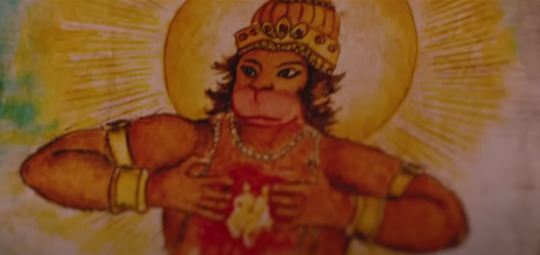
Usually, I talk about JTTW and Sun Wukong but this new movie trailer inspired me to take a look into this monkey god. Hanuman is the most celebrated and worshipped figure in Indian religion. And said to be the inspiration for Sun Wukong.
(What I wrote I just right what I learned from some research please don't hesitate to commoner below if I got anything wrong or missed anything Thank you. :) )
There are several stories told to explain Hanuman's origins.:
One interpretation Shiva and Parvati decided to transform themselves into monkeys in the forest. As a result, Parvati becomes pregnant. Shiva directs the wind god Vayu to carry the offspring from Parvati's womb to that of Anjana - an Apsara with the form of a monkey who has prayed to be granted a boy.
According to Hindu legends, Hanuman was born to mother Anjana and father Kesari.
Hanuman is also called the son of the deity Vayu (Wind god) because of legends associated with Vayu's role in Hanuman's birth and is said to be the incarnation of Shiva (Destroyer god)
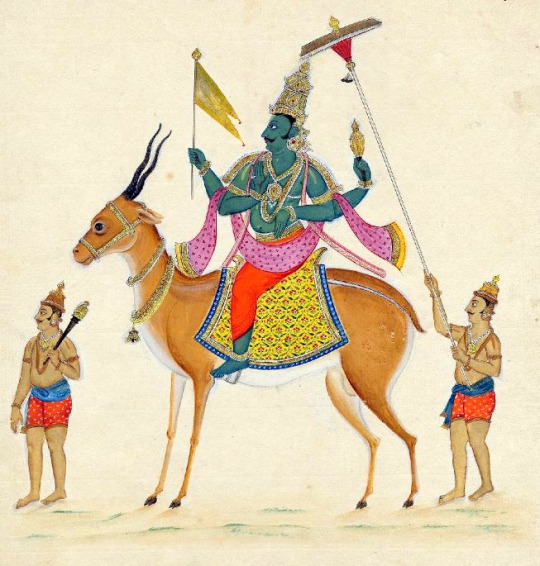
image above (Vayu)
Another tale of his birth is "when Anjana was worshiping Vayu, the King Dasharatha of Ayodhya was also performing the ritual of Putrakameshti yagna to have children. As a result, he received some sacred pudding (payasam) to be shared by his three wives, leading to the births of Rama, Lakshmana, Bharata, and Shatrughna. By divine ordinance, a kite snatched a fragment of that pudding and dropped it while flying over the forest where Anjana was engaged in worship. Vayu delivered the falling pudding to the outstretched hands of Anjana, who consumed it, leading to the birth of Hanuman".
The majority of the stories contain Vayu and Anjana.
Similar to Wukong Hanuman had a youth full of mischief (usually with the gods and sages) and some familiar powers.
"As a youth Hanuman often abused his powers to pester the saints and holy men living in a nearby forest, with tricks such as beard pulling and the dousing of sacred fires. However, it is as an adult that the monkey god Hanuman comes into his own."
"Indra, the king of the gods, struck Hanuman with a thunderbolt on the jaw(hanu), thus inspiring the name. When Hanuman continued to misbehave, powerful sages cursed him to forget his magic powers, such as the ability to fly or to become infinitely large, until he was reminded of them."
"The god Indra grants Hanuman a wish that his body would be as strong as Indra's Vajra and that his Vajra can also not harm him. Along with Indra other gods have also granted him wishes: the God Agni granted Hanuman a wish that fire won't harm him; God Varuna granted a wish for Hanuman that water won't harm him; God Vayu granted a wish for Hanuman that he will be as fast as wind and the wind won't harm him. Brahma also granted Hanuman a wish that he could move to any place where he could not be stopped. Hence these wishes make Hanuman an immortal, who has unique powers and strength."
"He is said to have transformed into the size of mountain, and flew across the narrow channel to Lanka." "he shrinks down to the size of an ant and sneaks into the city." "Upon arriving, he discovered that there were many herbs along the mountainside, and did not want to take the wrong herb back. So instead, he grew to the size of a mountain, ripped the mountain from the Earth, and flew it back to the battle. "
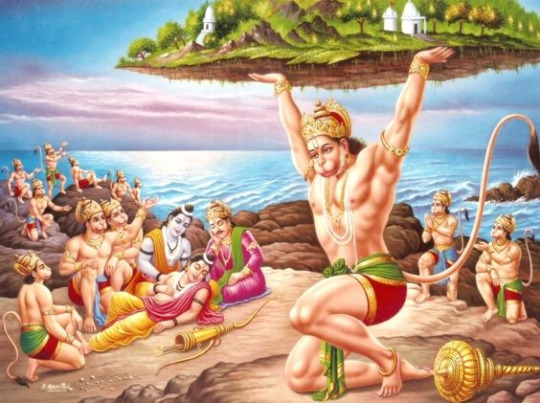
How the two are not alike is Hanuman was a being who wanted nothing to do with immortality and wanted to serve the Rama. Nothing like the free spirit and immortally seeking Wukong.
"After blessing all those who aided him in the battle with gifts, Rama gave Hanuman his gift, who threw it away. Many court officials, perplexed, were angered by this act. Hanuman replied that rather than needing a gift to remember Rama, he would always be in his heart. Some court officials, still upset, asked him for proof, and Hanuman tore open his chest, which had an image of Rama and Sita on his heart.
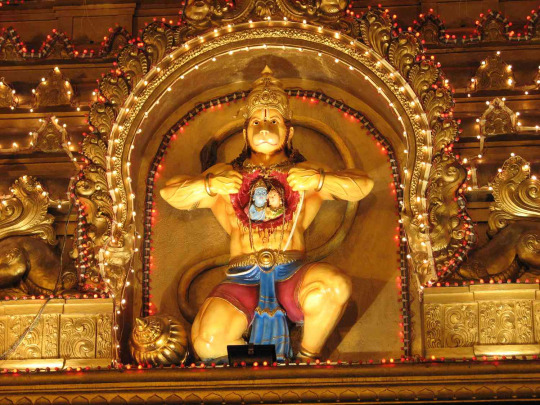
Now proven as a true devotee, Rama cured him and blessed him with immortality, but Hanuman refused this and asked only for a place at Rama's feet to worship him. Touched, Rama blessed him with immortality anyway. Like Shesha Nag, Hanuman would live on after the kalpa (destruction of the universe)."
Fun Fact:
The namesake " One interpretation of "Hanuman" is "one having a disfigured jaw". It is due to that earlier tale of Indra striking him as a child in the jaw with a lightning bolt. Because child Hanuman mistook the sun for a fruit and tried to take a bite.
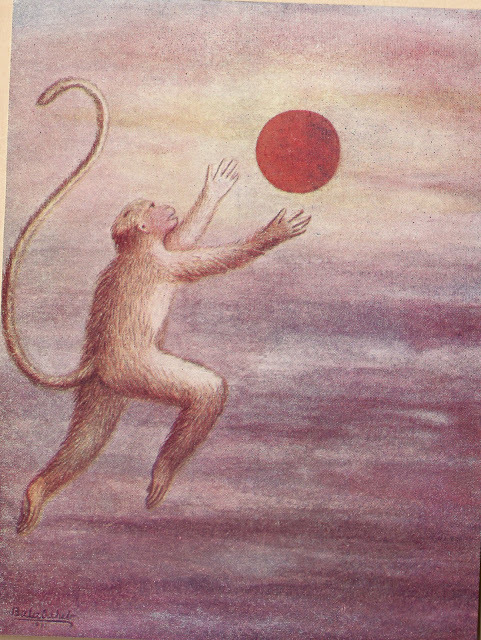
That then leads to the other gods and Indra giving him powers and wishes. There is another version the other is he was burned to ash and was brought back but had a bad jaw when he was restored.
"Though Hanuman is described to be celibate in the Ramayana and most of the Puranas, according to some regional sources, Hanuman married Suvarchala, the daughter of Surya (Sun-God). However, once Hanuman was flying above the seas to go to Lanka, a drop of his sweat fell into the mouth of a crocodile, which eventually turned into a baby. The monkey baby was delivered by the crocodile, who was soon retrieved by Ahiravana, and raised by him, named Makardhwaja, and made the guard of the gates of Patala, the former's kingdom. One day, Hanuman, when going to save Rama and Lakshmana from Ahiravana, faced Makardhwaja and defeated him in combat. Later, after knowing the reality and after saving both, he made his son, the king of Patala.o"
(Can't wait to see the movie Monkey Man when it comes out:))
23 notes
·
View notes
Text
I'm a day late woops but Happy Diwali everyone! Diwali is a Hindu festival that starts November 12 and ends the 16th! It's the festival of lights and celebrates the light's victory over darkness! In some parts of India, it's also the celebration of the goddess Lahkshmi's birth when she came out of the sea! And it can also be the celebration of when Lord Rama and Lady Sita returned to their kingdom from their 12 year exile!
So I decorated my altar space with my postcards of Lord Rama and Lahkshmi. And I was able to order a little tray in time that had little Lahkshmi and a little Ganesha, as well as an oil lamp and a place for incense cones!
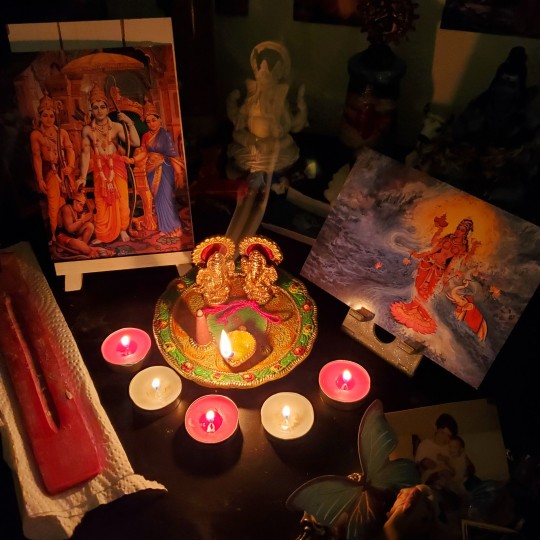

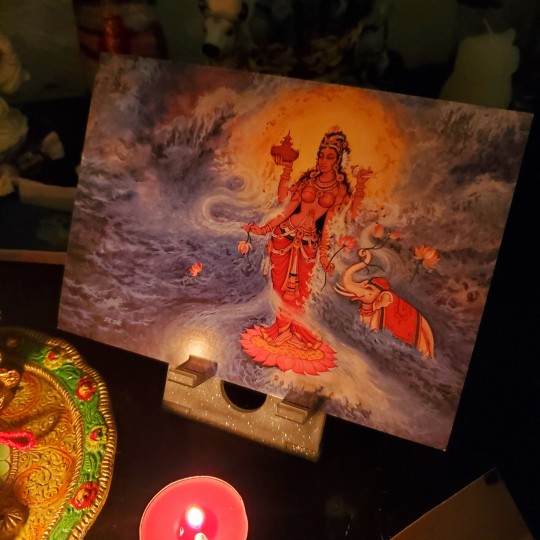

🎇🎆🎇Happy Diwali to all!! 🎇🎆🎇
@ariel-seagull-wings @ailendolin @aragarna @silverfoxstole @professorlehnsherr-almashy
28 notes
·
View notes
Text
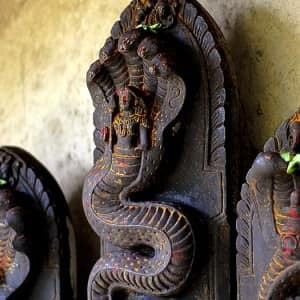
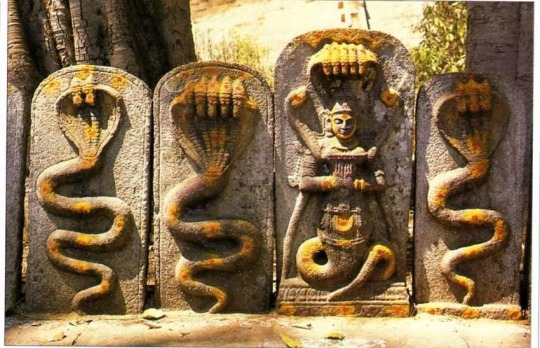
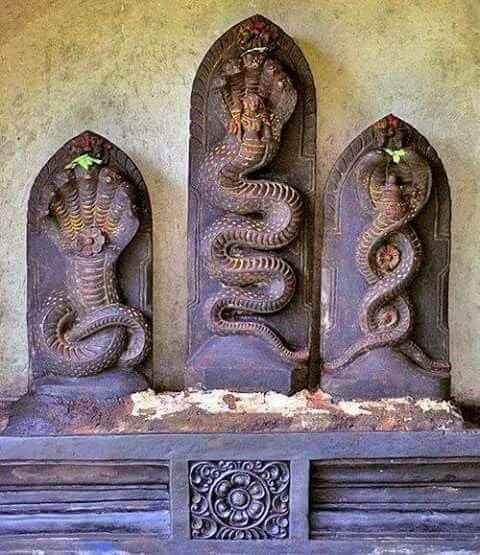
Ashta Nagas 🐍 Name of Ashta Nagas – 8 Snake Gods or Serpent Deities In Hinduism, the Ashta Nagas are eight gods who are snakes. South India, especially Kerala, South Karnataka, and parts of Tamil Nadu, is where they are most famous. Each of the eight snake gods is honored on its own. List of Ashta Nagas- Name of 8 Snakes God Ashta Nagas are worshiped to cure of skin diseases, pregnancy problems and to avoid all kinds of problems in the zodiac caused by Rahu and Ketu being in bad places in Horoscope. People also belive that making offerings to the eight nagas will help them find hidden wealth and happiness. They are Anantha or Sesha Naga Gulika Vasuki Shankapala Thakshak Mahapadma Padma and Karkodaka Chapter 5.2 - Ashtanaga—Eight important Nagas Out of the one thousand serpent children Kadru had, 8 important nagas are called Ashtanagas. They are: 1Ananta, 2 Vasuki, 3 Takshaka, 4 Karkotaka, 5 Shankha, 6 Padma, 7 Mahapadma, 8.Gulika. They are the nagas that are worshipped. Many of the ashtanagas are important characters in the Itihasa Puranas. Ananta He is the most important of the ashtanagas. The name itself means one who has to end. It means he is infinite. About the birth of Ananta, ValmikiRamayana says like this. From Mahavishnu came Brahma and from Brahma came the Prajapatis. From this it can be surmised that Ananta is a Prajapati.But as per the Mahabharata,Ananta is born to Prajapati Kashyapa in his wife Kadru. When Kadru and Vinatha, two of the wives of Kashyapa, were fighting and to win in the bet Ananta was asked to hang from the tail of Iravata. Ananta lost his peace and so went to places of pilgrimage and fasted. Immersing himself in reflections on Brahma, he obtained a boon from him. The boon was that even if the entire universe burns down, Ananta will not perish. That is how Ananta becomes Adi Shesha and the leader of nagas. He also became the bed and shade of Mahavishnu. It was because of the boon he received he went into the Hades and began to hold the worlds upright supporting them with his hoods. It is garuda that helps Ananta in this task of holding the worlds. Ananta has one thousand hoods and on the main hood there is the mark of Svastika. This indicates the Sun and Vishnu. As weapons he holds a plough in one hand and an iron pestle or mace in the other. He is served by Shridevi, Varuni Devi, Nagakanyaka and many other goddesses. The belief is that Ananta dwells in the abode of Varuna in the West. Ananta is not merely the eldest of the brood, but he is the noblest and occupies an elevated niche in the hierarchy of things. He is softspoken, philosophical and has an ascetic character. He is the one who leads the group of ideal serpents. Two of Ananta avatars are Lakshmana, the younger brother of Rama and Balrama, the elder brother of Krishna .The Anantashayanam indicates the mutual relations between Vishnu and the Serpent. Vasuki He is the son of Kashyapa and brother of Ananta. He spent his childhood with his parents. As a devote of Shiva, he dwells in the body of Shiva. According to the Puranas, it is thought that Vasuki is the ring on the finger of Shiva. In the quarrel between Kadru and Vinata, Vasuki did not support his mother and so he was cursed and therefore he had to live away from his mother in a different group. Vasuki has a special place amongst the important deities of Shaivas. Vasu means diamond. The one with a diamond on the head is Vasuka, that is Kashyapa. the son of Vasuka is Vasuki. Vasuki has the white colour of diamonds. When the Devas and Asuras churned the Ocean of Milk, they used Vasuki as the coir for binding the Manthara Mountain which was used as the churning stick.
#vedic#hare krishna#iskcon#krishna#bhakti#srila prabhupada#bhagavad gita#Hindu#Hinduism#Bharat#India
2 notes
·
View notes
Text

More Than Diamonds
Announcement
Hello, due to changes of work place, and applying to master degree I took a hiatus; while I have returned, I found several plot holes in my draft and things I would like to change, so it will fit to other stories I plan to publish, however it will not affect the main story plot.
I will not take More Than Diamonds down, but at the same time I am currently in the process of re-writing the story. When I have publish the chapters, I will put a note showing when it was re-published.
Thank you very much for supporting this story, and I will try to make it better in the future
Pairing: Prince Friedrich x Princess! Reader Description: Britain has gained themselves a new royalty nearing the debutante ball of 1813. Princess Amelia of Siam was sent as the new Ambassador of Siam. In Britain Princess Amelia was able to find her family, but will that be all? After the failed courting between Daphne and prince Friedrich, it was a surprise to everyone that he stayed in London. However, Prince Friedrich is anything, but a coward. He came to Britain to find a wife and one failed courting will not chase him out of the country with a tail between his legs. What both Amelia and Friedrich never thought to happen is, the friendship that blossomed between them and their growing feelings for one another. Friedrich was never a coward, but he is when it comes to Amelia. Everyone said Amelia is a genius, but not when it comes to love, because she is truly lost on what to do with these butterflies in her stomach. Tags: Slow burn, Coming of age, Time-Travel, Back to the past, Friends to Lovers, Royalties, Oblivious!FLxObvious!ML, Jealous! Friedrich, Slightly Possessive! Friedrich, Black cat gf, Golden retriever bf Timeline: S1&S2
Chapter 1. Ready, Set, Sail!
[Bangkok, 1812]
Her fast-approaching footsteps echoed in the hall of the Grand Palace. Her long, dark brown hair swaying with every move, the crinkling sound of her bracelets ringing like bells. Reaching the room she was searching for, she slammed the door open without bothering to knock.
“Brother!” She marched inside, stopping just in front of a desk. The man behind the desk glanced up slightly from the documents he was reading, dark brown eyes meeting her light brown ones. Her eyebrows furrowed as a frown marred her face.
“Yes, Apsara?” He sighed and set down his document to give her his full attention. He had a feeling about what they would be discussing now. Amelia’s frown deepened, and her fingers reached to toy with her bracelets, leaving a crinkling sound ringing across the room.
“I am to set sail for England. London, to be precise,” Amelia bitterly spat. Her light brown eyes equally analysed her brother’s movements, the same way he was doing to her right now. His dark brown eyes searched for any muscle movement that might betray her facial expression and let out a low humming sound.
“I see…” He intertwined his fingers on top of his desk. “You will be missed, dear sister. When will your trip start?” While her eyes might not betray her, her jaw did. Amelia tightened her jaw to prevent herself from outright cursing at her brother, Rama III, the strongest candidate for the throne, but more than that, he is her older brother, the one of the bunch who actually cared for her. Or so she thought.
“Do you mean that, brother?” Rama III, or by his birth name, Thap, saw the crestfallen look of his sister and how her voice trembled at the end. He knew she probably felt betrayed and speculated that he was sending her away because he didn’t love her anymore.
“Your absence will certainly be missed, Apsara,” he sincerely said, but this angered her even more. The pale cheeks she got from her mother’s heritage were now red, tears pooled her eyes, and her bottom lip trembled. Now this alarmed him. If she cried out in frustration, he would definitely be in trouble with Father. Truly, he just wanted to tease her a bit before explaining why she was the best candidate to go as an Ambassador, representing Siam.
Despite being half-siblings, Thap was actually doting towards most of his younger siblings, not that he would admit it. However, he had a bigger soft spot for Amelia than others, especially since he saw and took care of her more than his other siblings.
“Brother Thap, are you sending me away?” Aww… This is actually sad. Amelia was now looking very much like the sad wet cat meme. “I cannot say the same about our siblings, but you must know that I have no ambition for the throne, brother. Do remember that my gender disallows me to. I will never covet your right for the throne–” “And I appreciate you for it, Apsara. By no means did I ever think that you would covet the throne,” Amelia looked up at him, all crestfallen.
“Then why did you ask our father to send me away to England? There is no reason for me to be away from my own country and to a faraway land–” Amelia stopped for 3 seconds “Am I being cast away-” “No,” he quickly answered, now she was confused. “Want to give it another go?” Amelia glanced at the ceiling before her eyes were back at him. “I’m getting married-” Thap barked out a laugh “Father would rather shave himself bald than let you get married.” He waved in dismissal.
“I’m getting sold off?” Thap gave her a weirded-out look. “Cattle would be much more beneficial. We are not lacking in funds that we need to sell you off–” Well, rude. “Then why are you sending me away to England?” Amelia groaned, frustrated.
“You are to represent Siam in England as the new ambassador.” Amelia looked at her brother, flabbergasted. “Brother… You are the ambassador. You are Siam’s Minister of Trade and Foreign Affairs. I can’t do that to you.” Thap nodded with a smile and got up from his seat to stand in front of his younger sister.
“Many people said that I am the most intelligent out of all the siblings, but we know that is untrue. Everyone in the Siamese court knows I can’t become the Minister of Trade and Foreign Affairs without you, and I am upset despite being the one deserving of the position, you are being prevented by your gender.” He stroked Amelia’s head gently.
"I know you love Siam, which is why you are so against leaving the country, but right now, Siam needs your help to solidify our position internationally, and we need the best person to represent us. There is nobody better than you, Apsara. One day, when I take the throne, I want to change our country. I want you to be Siam’s very first female Minister of Trade and Foreign Affairs." Amelia took a sharp breath, and she stared at her brother. Scrunching her face a bit, she let out her breath of defeat.
“There is no end when it comes to arguing with you, brother. If you are sure about this… Then I will accept the mission. Father arranged for me to depart in January.” Amelia leaned forward and hugged her older brother affectionately.
“So you will set sail in January. Make sure to choose your staff, 10 people, and we will prepare your residence there. Also, go to your mother.” Amelia distanced herself from him. “10 staff? Why do I need so many people?” Thap just realised that all this time Amelia prepared him to deal with foreign affairs, but this will be her first time travelling abroad. His sister will be on a boat for a month and then be in another country for… He doesn’t know how many months or even years. Colours start to drain from his face. His sister… She will be vulnerable.
“Apologies, sister. Make it 20.” “20 staff? Whatever for?” Amelia blinked as Thap continued to pat her head. “Maids to take care of the house, head-chef and sous-chefs, personal doctors, ladies-in-waiting, lord-in-waiting for foreign affairs, baroness-in-waiting for dealing with high-society, especially when dealing with the wives and at least 6 royal guards.” Amelia wanted to reject and say that amount of people is too much, but she knows it’s no use to argue with her brother. He is like a dog with a bone and will never let go, so she just nods.
***
[Bangkok, 1813]
This is it… No backing down. Tomorrow, Amelia must depart for England, a foreign land far from her home. She has been to London before, far in the future, when she was still Pimchanok Davika Yontararak. Amelia wanted to survive and see Siam, or what in the future would be Thailand, thrive. Instead of becoming a diplomat, she pushed her brother, Rama III, to be the perfect diplomat and politician. He has the potential.
Now Amelia can’t hide behind her brother as he pushes her forward into the limelight. Like Davika, who flew to America, tomorrow, Amelia will set sail to England, once again as a diplomat. ‘What a terrifying coincidence,’ Amelia thought to herself as she watched her maids packing up belongings that will be in her carry-on.
Amelia must admit, her greed to make Siam a great country has pushed timelines forward. Siam’s openness towards modernization and western nations was supposed to happen in the future, during her younger brother, Mongkut’s reign. Yet, she is stealing ideas from people and stealing ideas from the future, developing them themselves.
“What are you thinking so hard, Apsara?” Her mother placed a palm on her shoulder as she joined her on the bed. “Nothing, mother. Just dreading the long journey to England. I will be on a boat for a whole month.” Amelia sighed and leaned her head on her mother’s shoulder.
“Oh, I know, honey.” Her mother kissed her on the forehead. “I remember how I travelled to Ayutthaya all those years ago. It took me 1 and a half months to arrive.” This made Amelia sigh and sneak her arms, looping it on her mother’s waist. “I’m going to miss you, mother.” Her mother hugged her close, stroking her back and combing her hair with her dainty fingers.
“Ahem—” And just like that, their mother-daughter moments were ruined. Amelia looked behind her shoulder to see her father standing there. Her light brown eyes narrowed as her piercing gaze pinned on her father. “Seeing your daughter for the last time before exiling her to another man’s land, dear father?” Her father, Rama II, or known by his birth name as Chim, rolled his eyes as he walked inside her chamber, passing through the bowing maids.
“Stop being dramatic, Amelia. I’m here to see my wife, right, Felicia?” He tore her mother from her embrace and brought her to his lap as he sat on her bed. Felicia quickly encircled her arms around his neck and his on her waist.
“How was your day, darling?” Felicia asked as he was busy leaving kisses on her cheek. Amelia groaned at the public display of affection and flopped back on her belly. “Can you love birds leave my chamber? If you want to act all romantic, please do it somewhere more private so I will not be scarred for life.” Chim gave her a teasing look.
“Then find one for yourself—” Amelia sat up. “If I find one there, I’d have to go wherever he goes. Do you really want that?” His smile dropped so fast. “No. You’re there to work, not to find a husband. Apsara, you better not go back with a suitor or worse—pregnant.” Felicia laughed at her husband’s overprotectiveness of their daughter. This made Chim pouted a bit as Amelia chuckled and shook her head. “Come on, darling. Apsara needs to sleep as she needs to wake up early tomorrow.” Chim was still pouting, but he followed his wife. The pair went out after giving her a kiss on the forehead.
***
Her departure was quick and not all that touching, to be honest. Her father and brother, Rama III, acted all formally about this. They reminded her of her responsibility as Siam’s representative in England and told her, while she is an ambassador, she is also a princess. If anyone at all tries to besmirch her name, Siam will not hesitate to reciprocate and declare war.
“Oh, my daughter Apsara.” Felicia hugged her only child and daughter. “You are now so big and about to travel all on your own.” She cupped Amelia’s face using both of her hands. Her mother was warm, was what Amelia was thinking about. She will definitely miss her mother’s warmth.
“Apsara, I need you to do me a favour.” Felicia handed her a necklace with a locket and a letter. “Give this to the Duke of Gloucester and Edinburgh, Prince Henry William of Gloucester, or the Duchess of Gloucester and Edinburgh, Abigail of Gloucester. I need you to find them for me.” Amelia gave it a look before accepting the letter and necklace with a nod. “Alright, mother. I will make sure to give it to them and send you a letter once I do.” Felicia nodded and gave Amelia a hug one last time.
The sight of her family waving on the dock as she set sail was something she would never forget. Her younger brother from a different mother, Mongkut, was crying as he held on to his father. Amelia was surprised; after all, despite helping with his education, she could not say they have the best relationship. At most, they were civilised with each other.
Amelia turned around once the ship was far enough from the sight of her family. Well, this is it. The start of her month-long journey to England.
***
[London, 1813]
Contrary to what she thought, a month passed by quickly. Throughout her journey, she managed to visit many countries and grasp the basics of their main supplies and demands. This was important information, after all, so she tried to gather as much as possible and planned to write this back to Rama III as soon as she arrived in London.
As soon as she arrived in London, Amelia and her 20 staff were greeted by the British King’s Guards. Hugo, her lord-in-waiting, was sorting it out with the guards. Soon, they were divided into 4 carriages. Amelia, her lord and lady-in-waiting, along with the Siamese Royal Guards, all headed to the palace, while the rest of her entourage were sent to her mansion, one that was prepared by her father.
Buckingham Palace was grand, although lacking in colour; most of the exterior of the building was cream and white. Very different from the palace back home with all the intricate shapes and gold colours.
Right now, Amelia was waiting to be presented to the Queen of England, Charlotte of Mecklenburg-Strelitz, the wife of King George III, and one of the more prominent characters in the Bridgerton series. Man… She didn’t even get to watch Anthony’s season as she died too soon… Amelia sighed as she toyed with her rows of gold bracelets on her arms. She had replaced her headdress with a simple tiara while she was in England and decided to only wear it during formal occasions.
A knock erupted from the door. One of her guards opened the door along with Hugo. It was one of the Queen’s ladies-in-waiting. She was here to inform them the Queen was ready for their appearance.
“Lady Amelia, Queen Charlotte of England is ready,” Hugo informed her as she nodded. “Alright,” Amelia replied, standing up, and Lynn, her lady-in-waiting, helped to straighten her clothes.
“Once you are in front of the room, wait for a moment as the Queen’s guard will announce your arrival,” Hugo explained to Amelia the procedure in Siamese language. Amelia nodded. “Will it only be the Queen?” Hugo shook his head. “Aside from the Queen and her ladies-in-waiting, I heard she also gathered her children. The King, on the other hand, is absent as he has been ill for some while.” Amelia nodded, and they stopped their conversation as they arrived in front of the room.
“Ambassador of Siam, Lady Amelia Chakri.” The door was soon opened, and Amelia quickly looked straight at the Queen, who was standing in the middle of a podium, surrounded by her ladies-in-waiting; she could see the Princes and Princesses standing on either side of the podium. Amelia tried to remain stable and perfect.
With practised grace, Amelia kept her gaze straight on the Queen as she walked with poise. Her steps were confident and never faltered. Several steps from the podium, Amelia stopped and did a proper curtsy to the Queen and greeted with a simple ‘Your Majesty’. No suspicion there…
As Amelia ascended, she could see the satisfied smile of the Queen. The Queen stepped down from the podium to greet Amelia. Her eyes wavered a bit. Fuck-
“Greetings, Lady Amelia. I hope there was no trouble on your trip here.” Amelia gave the Queen a smile. “There was none, your majesty.” The Queen nodded before she gestured to her children. No way…
“Lady Amelia, I would like to introduce you to my children,” It was a long introduction and chat as one by one, all her 15 children were introduced to her. Queen Charlotte had the face of Golda Rosheuvel- The actress who played Queen Charlotte in the Bridgerton series.
Words: 2615 words
Edited: 29 March, 2024
More Than Diamond's Master List
IMPORTANT NOTES A/N: Hello, how are you guys? I hope you are well. Regarding this story that is following Julia Quinn's hit series, Bridgerton, I would start by saying I read the book first before I watch the Netflix series, thus I apologize if there are some differences with the Netflix version, but I will try to make it as similar as possible. I would also ask the readers to be kind when criticizing this story as this is my first time to actually publishing my work in the open. For the story, as you can see there is a time-travel tag. Our reader was sent back to the past with all the knowledge from the future. If you are also confused with Davika's education, I actually based her using Spencer Reid, a character from Criminal Minds. I also made Friedrich to be a year younger than Benedict when in actuality, he was born in 1794, 2 years younger than Daphne. If you are not interested or felt like those 2 themes ruined a historical romance story, then please do not leave any bad comments as you can just stop reading this story. Thank You Very Much! Much Love, Cinnamon Meilleure's Writing Room
#bridgerton#prince friedrich#lisa#lalisa#thailand#prussia#writing prompt#historical romance#history#romance#friedrich of prussia#freddie stroma#queen charlotte#daphne bridgerton#simon basset#anthony bridgerton#kate sharma#time travel#back to the past#historical#regency era#prince frederick#colin bridgerton#benedict bridgerton#kit connor#eloise bridgerton#hyacinth bridgerton#francesca bridgerton#gregory bridgerton#violet bridgerton
39 notes
·
View notes
Text
Winter, Year 8: Lyndlia
Here is a post that has been in my drafts since January. Yesterday was the first time in six months that I got bored enough to load up my game. I just haven't had the time or the desire to play. I played a different neighborhood instead, but since my internet seems to be working on my desktop at the moment, I'll see if I can write this update on my kingdom from my drafts.
Cecily and Lynette are the most twin-like twins I've had ever in my game. They're both pleasure sims, both started careers in dance, and gave birth to sons hours apart (even though their birth times fell on different seasons.)

So of course they both had to follow their wants of getting engaged at the same time. Ian and Rama both had other love interests (and possibly better ones) but the Lyndlia twins won out for now.


Rama had a few hearts to break as he tried to let down his former lovers gently.


He didn't count on Cecily's baby sister being among those he would have to reject.


He's not alone though, as Delilah is trying hard to find love in all the wrong places.


There are a lot of romantic misunderstandings that need to be sorted out.


Finally, the big day arrives for a double wedding. The guests arrive.

The wedding arches are set up and the ceremony beginnings. (I knew I wouldn't be able to time them exactly together, but the ceremonies were close to happening simultaneously.)

And both ceremonies were successful. Cecily basks in the applause following her nuptials with Rama


and heads to the audience to watch Lynette and Ian exchange their vows.

Later Ian helps his son, Irving, and his new nephew, Remington, enter the toddler stage.


2 notes
·
View notes
Text
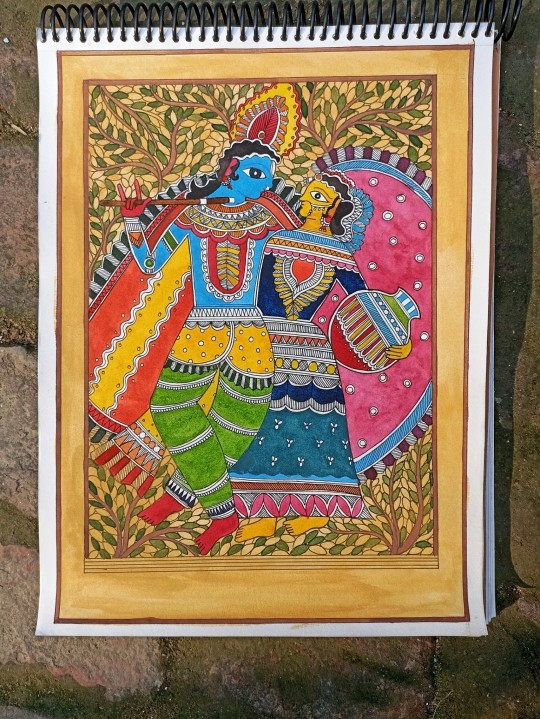
Tried madhubani painting after a long time.
The key feature of this type of painting are the lines used. All the patterns used for decoration of the figures are made simply through the combination of different kinds of lines.
Madhubani paintings also known as mithila painting are a famous folk art style of India.
It derives it's name from the place of it's birth that is mithila in present day bihar.
Mithila is famously known for being the birthplace of devi seeta, the consort of Sri Rama.
#madhubani#madhubanipainting#art style#illustrators on tumblr#artwork#art study#sketch#digital drawing#bihar#madhubani paintings#mithila#mithila painting
8 notes
·
View notes
Text
Horoscope of Lord Rama & Lord Krishna
PREFACE & ACKNOWLEDGEMENTS:- Before starting with the topic of Lord Rama & Lord Krishna, I would like to tell that Date & Time of Birth of both the avatars are not accurately known, due to passage of thousands of years from their birth time and no english calenders were available at thar time. The information were passed on from generation to generation with comments from famous astrologers, astronomers & philosophers. The validity & correctness have to be verified by practical events, established facts & archaeological evidences. It is in this context, I would like to thank Sri K.N.Rao, a reputed & famous astrologer & living legend, who boldly put forward the horoscopes of both Lord Rama & Lord Krishna as taken from his Guru Sri Yogi Bhaskar Anandji & logically analysed the practical events with standard astrological norms. The splendid analysis by Sri K.N.Rao in his 5 “You Tube” videos in an interview to “Saptharishi Astrology” is breath taking & monumental gift to the viewers. I acknowledge having taken reference from his videos, but he is in no way responsible for the views expressed on my own. In the absence of exact degrees of planets & missing information about Mercury’s position,even in Valmiki Ramayan, I would go by the statement of Sri K.N.Rao & accept Mercury was in Aries & contradictory statement of position of Sun in Pisces as against Aries indicated in Valmiki Ramayan.
HOROSCOPE OF LORD KRISHNA
Lagna & Moon—Taurus, Jupiter-Cancer, Sun & Venus -Leo, Mercury-Virgo, Saturn- & Rahu-Libra, Mars-Capricorn, Ketu-Aries
HOROSCOPE OF LORD RAMA
Lagna, Jupiter & Moon-Cancer, Saturn-Libra,Venus & Sun-Pisces, Mercury-Aries, Mars-Capricorn, Ketu-Gemini, Rahu-Sagittarious
Lord Vishnu takes his incarnation on earth at his will based on demands of the world in different forms at different times. The incarnations reinforce the idea that rules & regulations that maintain law & order are in tune with the changes taking place. The concept of incarnation is based on Yuga Dharma.
Lord Rama’s incarnation justified the needs of Treta Yuga. The challenges of Dwapara yuga required much more & Lord Krishna’s incarnation justified it. Krishna’s departure from this world paved way for Kaliyuga.
There are many differences in these 2 incarnations. Krishna appeared as a Universal God to preach humanity. He was the embodiment of all that Universe was symbolized. All his childhood experiences that exposed his mystical actions & performances were beyond anybody’s guess.
Even before he attained 11 years of age, many mystical happenings took place. His very birth was in a jail at “Abhijit Muhurta”, most auspicious(rarely referred to night birth). His life started with very 1st miracle, that all the lights went off & all inmates of jail were rendered unconscious & jail gate opened suddenly of its own, automatically & allowed Vasudeva to go out with the child in the basket on his head & jail gate closed on its own. Vasudeva carrying the child proceeded towards river Jamuna, which was in spate of floods due to heavy downpour of rain. The river did not allow him to move forward until he lowered the basket & made Jamuna to touch Krishna. He then proceeded to Brindavan & exchanged with female child & returned to jail, where again jail gates open up on their own & allows him inside. Gates get closed & all inmates regain consciousness as if they were waken up from sleep.
All miracles like, killing Putana (rakshasi), by sucking her breast full of poison, Kalinga Mardhana, killing of Shakatasura, lifting of Govardhana Giri(hill), Rasa kreeda with Gopis, Vishwarupa darshan to faster mother Yashoda when he opened his mouth & many more incredible things unimaginable in normal circumstances.
“ Rasa kreeda”, of Krishna dancing with 1608 Gopis simultaneously at the same time symbolizes Kundalini Shakti going up & reaching “Sahasrara”, thousands of lotuses called Gopis blooming. This is a form of transforming sexual energy into creative energy. When these incidents took place, Krishna’s age was within 11 years & do not have any bearing to sexual implication.
Lord Krishna proclaims in chapter 4, text 8, of Bhagavad Gita,
“Paritranaya Sadhunam,Vinasaya cha duskritam,Dharma-Saamsthapanarthaya,Sambhavami Yuge Yuge”(Protection of good & virtuous,destruction of evil, re-establishment of natural law, I will come in every age)
Krishna’s support to Pandavas & making Mahabharata war as a meeting point to destroy evil forces & establish Dharma was a “Miraculus high voltage drama”. But for Krishna, Pandavas could not have dreamed of winning the war. Every stage of the war was preplanned by “Divine Force” & guided by Krishna, through his wisdom & timely unprecedented action. The preaching of Bhagavad Geeta to Arjuna was not a mere incident by any means, but a very calculated logical conclusion of worldly teaching to humanity. His timely guidance to Pandavas for appropriate method to kill great warriors was not a mere concoction but revealing of past births of important opponents & their expected nature of death & timing. Complete past life history & curses of all important warriors were exposed at appropriate times, when the death time of each was approaching.
Jayadratha’s death was one such case, when Krishna guided Arjuna to kill him. Seeing the fast approaching sun set, he delayed the sun set by magic (maya or eclipse) & created an illusion as if sun was set & then after eclipse is removed, he asked Arjuna to kill him & transport his head to his father’s lap, killing him also.
Instances of deaths of Karna, Drona, Duryodhana etc..had their own stories. Dharmaraja’s Rajasuya yaga witnessed the death of Sishupala, when he opposed Krishna being respected. Krishna killed him with Sudarshan Chakra, in the midst of dignitaries due to his last chance of 100 mistakes.
Protection of Draupadi in Kaurava Sabha was another historic event. When Dushyasana dragged Draupadi’s sari, neither Pandavas nor assembled dignitaries could come to her rescue. When Draupadi prayed Krishna with single hand & holding the sari in another, Krishna did not come to her rescue. When she prayed with both hands together, Krishna protected her by magic of increasing the length of sari continuously until Dashyasana gave up fully tired. This showed that “ABSOLUTE SURRENDER TO GOD” does protect one in distress.
LORD KRISHNA’S HOROSCOPE ANALYSIS:-
1.Born in Rohini Nakshatra in astami tithi in Taurus Lagna
2.Moon, Jupiter, Mercury, Mars, Saturn(All exalted)
3.Sun in his own house with Venus
4.Venus is lord of 1st & 6th(Behaves more as lagna lord, because of moola trikona)
5.Venus as 1st lord & Sun as 4th lord in own house (kendra & kona)in 4th from lagna
& sandwitched between 2 exalted benefic planets,Jupiter & Mercury & forms several
good yogas.
6.7th house(Scorpio) aspected by exalted Moon & exalted Jupiter.7th & 12th lord Mars, exalted in 9th in mutual aspect with Jupiter(8& 11th lord) & Moon, creates vipareeta Raja yoga in addition to many other Yogas. Krishna had 16108 wives but with sublimated sex energy, due to Venus free from any blemish, due to non interference of Rahu, which is under the control of Saturn. Krishna was with all the wives simultaneously, something that nobody can imagine or evaluate.
7.Moon in Rohini(Moon’s constellation), exalted in lagna, made him mentally strong & powerful. Moon being 3rd lord exalted in lagna & Jupiter, exalted in 3rd in mutual aspect with exalted Mars,
8.Mercury as 2nd & 5th lord exalted in his moola trikona & own house, unaspected by either benefic or malefic made Krishna, the master of 64 Kalas & 14 Vidyas of Ancient India, which was a remarkable outstanding performance by any means.This made him a great intellect of all times surpassing all others.
9.Jupiter 8th & 11th lord exalted in Moon’s house(3rd), made him the youngest of all. Since Jupiter is heavily afflicted by exalted Mars & exalted Saturn, all those born before Krishna were brutally killed by Kamsa(Saturn in 6th-house of uncle)
10.4th lord Sun in own house & aspected by 12th lord Mars, made his mother to be jailed by Kamsa
11.9th lord Saturn exalted in 6th aspecting 12th, made his father to be jailed
12.10th lord Saturn in 6th, along with Rahu(in the house of maternal uncle) & Mars as 7th lord exalted in 9th & aspecting afflicted 6th lord Venus in 4th with 4th lord Sun, makes Krishna to kill Kamsa. It appears imperative that his mother was one of the conditions for this act, since she was imprisoned by Kamsa &Kamsa killed all her 7 children mercilessly.
13.Jupiter, deva guru exalted in 3rd(house of preaching) & Moon, 3rd lord lord exalted in Moon’s constellation, made him preach philosophy of life, a guarded secret of the past, present & the future.
14.Mercury as lord of 2nd(speech) & 5th intelligence, with the support of exalted Moon(strength of mind)& exalted Jupiter(knowledge of the Universe & all 64 kinds of Kalas &14 Vidyas), made him a super intelligent avatar purusha, the highly intellectual personality, 2nd to none. This was the only avatar of God out of 9 avatars, which gave humanity, the complete picture of Universe.
15.Exalted 7th lord(Mars) & exalted 11th lord Jupiter in mutual aspect with each gave Krishna, thousands of wives, who were blessed souls & devotees.
15.Putra karaka Jupiter exalted & Mercury in 5th own house exalted, resulted in birth of several good children.With all these, it remains an unbelievable historic account that Krishna had sublimed sex energy.Whenever one talks about Krishna as incarnation of Lord Vishnu, his human form & actions & emotions are found to be an eye wash, calling it as “Maya” or magic, which cannot be assessed by humans.
16.Since divisional charts cannot be casted due to absence planets degree positions, one cannot judge number of wives & children. In astrology, there are no ways to find thousands of wives or children.The prediction of this type leaves one guessing the essence of astrology. Krishna marrying 16108 women has a story that a rakshasa imprisoned 16108 women princesses(It is difficult to even imagine that number of princesses). Krishna killed that rakshasa & freed all. Society did not accept these women & hence as per their request, Krishna gave them the status of wives.
17.A very striking feature in his horoscope is that except 6th & 1st lord Venus & 4th lord(in own house), all other house lords are exalted. Moon dasa was running at the time of birth, made him strong in will power & courage which enabled him to show his prowess throughout Moon dasa & in subsequent Mars dasa of 7 Years & Rahu dasa for 18 years. All his childhood miracles & killing of rakshasas were before he attained 11 years of age due to Mars dasa & part of Rahu dasa. Rahu(represents Rakshasa) in 6th house,created innumerable enemies from Rakshasas, Saturn in exaltation in 6th in the company of Rahu fuelled the situation for inviting more enemies & crushing . In all probabilities, Mars dasa Rahu bukty would have brought destruction of Rakshasas, before the age of 11.
19.5 planets exalted & 1 planet own house justifies all miracles & unusual things happening. Rahu in 6th with exalted Saturn indicates black magic & miracles.
20.Krishna was always tricky, which was due to 10th lord in 6th
21.His smiling disposition & attractive personality, playing on flute, were all the result of exalted Jupiter, strong position of Sun,Venus in 4th house & strong 3rd house, in addition to exalted Moon in lagna.
LORD RAMA’S HOROSCOPE ANALYSIS
Rama was an embodiment of GOD in human form. He was bent upon meeting the commitments of his father to his 2nd wife Kaikeyi by obeying his order. He did not deter from facing the hands of fate even in the most adverse circumstances. When Krishna had smiling disposition, Rama was always “Gambhir”(Dignified) & was called “Maryada Purusha”. He had no smile in his face. He was always bent upon doing his duties & never deviated from truth.
He was symbolic representation of a true & obedient son of a father, faithful husband of a wife, affectionate & helpful to his brothers, real tie of friendship to those who offered to help him at all times, respect to elders, reverence to Rishis & holy people & a terror to wicked & sinful people.
When Krishna was a terror, miraculous & naughty right from his birth, Rama was a quiet, duty bound & obedient to his parents. Rama was symbolized with bow & arrow, whereas Krishna was symbolized with counch & Sudarshan Chakra. Both were bent upon protecting good & destroying evil, but their approach were modified in tune with the Yuga Dharma.
Krishna claimed himself as”Krishna astu Bhagavan Swayam” & a full or total incarnation of God. While Krishna reveals about himself, Rama never speaks a word about himself & unassuming. Rama avatar was not a full avatar. He was an avatar of GOD Vishnu in simple human form & was a teacher & demonstrator of way of life in theory & practice. His conduct, character & practical way of life was eye opening to one & all. His avatar was tailor made to suit the people of Treta Yuga, but the lessons he left behind applies even to Kali Yuga.
1.Rama was born in Chaitra masa, Navami Tithi in Punarvasu Nakshatra in Cancer.
2.Four Planets Jupiter,Venus,Mars & Saturn were exalted & Moon in his own house.
3.While Mercury was highly elated in 5th own, moola trikona, exalted house in Krishna’s horoscope, it was in Aries(house of Mars) in 10th house in the case of Rama.This is a glaring difference in their horoscopes. Krishna was highly intellectual, philosophic & master of all 64 Kalas,14 Vidyas. Rama did not preach philosophy, did not show extra ordinary talent, magic or miracle which Krishna demonstrated right from his birth. In Krishna’s horoscope,7th & 11th lords exalted & in mutual aspects gave Krishna innumerable wives, whereas in Rama’s horoscope Venus was exalted & aspected by exalted Jupiter(Dispositor of Venus)from lagna, where Moon, lagna lord is in lagna itself, Saturn, 7th lord exalted in 4th, gave Rama a beautiful, loving, affectionate, God fearing, dutiful single wife in contrast.
3.Even though Mars & Jupiter were exalted in both the horoscopes, there were differences with regard to lagna & position of Moon. Moon in Krishna was in Rohini in exalted state in Moon’s constellation, Whereas in Rama’s horoscope, Moon was in Punarvasu, Jupiter’s constellation & is placed along with exalted Jupiter. This made Rama, pious & God fearing, obedient person, whereas Krishna was outgoing, strong willed & courageous.
4.A great feature in Rama’s horoscope is that Jupiter, exalted lord of 6th & 9th is in mutual aspect with exalted Mars, lord of 5th & 10th from both lagna & Moon thus establishing contacts with 1st, 5th, 9th & 10th lord(Best kendras & Trikonas). This has made Rama “Maryada Purusha” of highest moral conduct & duty bound in performing his Dharma & Karma. Jupiter aspecting Sun in 9th house is “RAJA LAKSHANA YOGA”. Royal mansions are shown by Venus & Sun aspected by Jupiter.
5.Mercury as 12th lord & Saturn exalted in 4th made Rama to leave home & live in foreign place in forest life. Saturn is 7th lord, representing Sita. His wife also lived in forest due to aspect of Mercury 12th lord on Saturn.This aspect also separated Rama from Sita.
6.Aspect of exalted Mars & exalted Saturn on Jupiter & Moon separated Rama from his father & wife.This also indicates “SANYASA YOGA”
7.Sun, pitru karaka in pitru sthana & 9th lord Jupiter aspected by exalted Mars & exalted Saturn made Rama’s father to die early.
8.Ketu in 12th house denied bed comforts.
9.Rahu in 6th,made him “Kodanda Sani”. Rahu in 6th invites enemies & destroys them. Ravana & other rakshasas were killed by Rama.
10At the age of 16 Years, Vishwamitra Rishi took Rama to destroy rakshasas, Who were causing havoc to Rishis in their yagas & Penance. This must have happened in Saturn dasa, Rahu Bukty. Saturn is 7th lord exalted in 4th & Rahu in 6th house of enemies. Rahu symbolically represents Rakshasas & their destruction due to placement of Rahu in 6th house of enemies, killed them. Dasarata first refused to send Rama to forest at tender age, but after getting convinced of Rama’s strength as perceived by Rishi, he sent him along with Lakshmana.
11.Having born in Punarvasu Nakshatra, he was running Jupiter dasa at the time of birth. Subsequent dasa was that of Saturn for 19 Years. He got married to Sita, when he was 16 Years old in Saturn dasa/Jupiter Bukty, after Rama destroyed Rakshasas, who were causing troubles to Rishis. Saturn is 7th lord in exaltation in 4th & aspecting lagna, lagna lord Moon & Jupiter aspecting 7th house.Mars as 5th & 10th lord exalted in 7th & in mutual aspect with Moon & Jupiter in lagna. Since 1st, 4th, 5th, 7th, 9th & 10th lords have established contacts, marriage to Sita was destined & change of place of residence to Sita to enter royal palace was destined.
12.Mercury dasa, Sun Bukty would have caused the death of Dasaratha. See, Sun pitru karaka in pitru sthana, Mercury in 2nd maraka house from Sun & 9th house(father).
13.Mercury dasa, Mars Bukty would have caused kidnapping of Sita by Ravana. Mars in the 7th house exalted brings troubles to spouse. 12th lord,wherever he sits & aspects the house & the planet therein will bring trouble like kidnapping. Mercury as 12th lord is aspecting exalted 7th lord Saturn in 4th house, causing separation from Rama & denying comforts of house, represented by Mercury’s aspect on 4th house. Here, it may also be construed that Lakshmana(Lord of 3rd Mercury)might have been instrumental to go away from Sita & caused Ravana to come in disguise & cross Lakshman Rekha drawn by Lakshmana.This was due to Sita’s mistaken identity of Ravana in disguise of a Sanyasi, whom Sita wanted to respect. This enabled Ravana to kidnap Sita. All these incidents are pre planned by Ravana, ie sending Maricha in the form of abeautiful golden deer & attracting Sita. Being carried away by the beauty of deer, she asked Rama to fetch the deer. Rama who wanted to fulfil her wish, went behind the deer after asking Lakshmana to take care of Sita. When lord Rama hit the deer, Maricha in the form of deer cried in the voice of Rama & died. After hearing this shout, Sita mistook that Rama was in trouble & asked Lakshmana to go & save him. In spite of assurance from Lakshmana that nothing would have happened to him, she after abusing Lakshmana for crooked intentions insisted & forced Lakshmana to leave the place & protect Rama in trouble. Lakshmana after knowing her plight, reluctantly left the place after he put a “REKHA” in front of her & strictly instructed her not to cross the line or allow anybody inside under any circumstances. But due to Ravana’s trick, Sita mistook Ravana as a real Sanyasi & allowed him inside. This triggered her misfortune when Ravana kidnapped her.
14.Mercury dasa, Rahu Bukty would have caused the destruction of Ravana & other Rakshasas. Rahu in 6th destroys enemies.
15.Ravana had 10 heads gifted by Lord Shiva for his rigorous penance.They symbalised kama, krodha, moha, mada, matsarya, manas,buddhi, chitta, ahankara. Except Buddhi or intellect all others are harmful.10 heads of Ravana controlled his actions & made him perverted & ultimately caused his own destruction in addition to all his followers. Rama silently demonstrated the importance of controlling one’s senses & by killing Ravana, he proved the consequences of blindly obeying & succumbing to senses. Ravana’s 10 heads also depicted his mastery over 6 shastras & 4 Vedas, 64 types of knowledge & all arts of weaponry. But none of these came to his rescue when he was slaved by the senses.
16.Mercury dasa, Jupiter Bukty would have enabled Rama to rescue Sita from the clutches of Ravana & return to Ayodhya. Jupiter is 9th lord exalted in lagna & aspected by exalted 5th & 10th lord Mars from 7th. Since lagna, 4th, 5th, 9th & 10th houses & lords are involved, most of the matters connected with these houses were amicably solved.
17.Under same Mercury dasa, Jupiter Bukty, Sita became pregnant. See Jupiter aspecting 5th lord Mars(exalted).
18.Rama acquired the faithful & reliable friendship of Vibeeshana, brother of Ravana, Sugreeva(Vanara king) & faithful, obedient & ever devoted Hanuman, whose role in whole Ramayana was exemplary. See11th lord from lagna & Moon exalted in 9th & aspected by Deva Guru Jupiter from his exaltation position.
19.5th lord Mars exalted & aspected by exalted Jupiter & own house Moon gave him dutiful, virtuous & prosperous children.
20.Ketu dasa would have brought in separation from Sita & denying of bed comforts. Ketu is in 12th house of both lagna & Moon.There is a proverb in tamil that “Rahu poley koduppan illai, Ketu poley keduppan illai”,which means that Rahu gives plenty(material gains) & Ketu spoils material gains & gives spiritual enlightenment & liberation from shackles of birth & death.
21.Rama asked Lakshmana to leave Sita in Valmiki Ashram under the pretext of a dhobi’s comment that Sita was not pure under the influence of Ravana, when she was kept in Ashoka Vana of Ravana. Even though he knew the purity of Sita, as a common man, he took this decision to prove the world that he was bound by circumstances & planetary influences. Story continues…
Finally, we have to imagine the planetary positions in thousands of years to come to expect the next avatar of Lord Vishnu in the form of”KALKI”. The permutations & combinations will be such that when the planets take up their positions, they would synchronize with the avatar of God & purpose of that avatar. These happen in thousands of years of transits of planets. It is not humanly possible to predict such an event.Whatever may be the form of avatar, one common goal of avatar would be for “Protection of good & virtuous, destruction of evil & re-establishment of law & order.
CONCLUSIONS:-
It is believed for thousands of years, that Lord Rama & Lord Krishna were God incarnations, in “Treta” & “Dwapara Yugas” respectively to establish “Dharma” by annihilating evil. Whereas Lord Rama showed the virtuous way of living through practical demonstration & Lord Krishna opened up the subject of creation of “Cosmos “ & imparting “True” knowledge through his legendary “Bhagavatgeeta” narrated to Arjuna, only as a channel in the context of “Mahabharata War between Pandavas & Kauravas”. What made the differences in these two Incarnations is the subject for study through an attempt to analyze the horoscopes in the context of human forms, though humanly impossible to give explanations through senses & limited intelligence.
#astrology#vedic astrology#vastu shastra expert#aries astrology#astro notes#vedic astro observations#astro observations#astro posts#astro placements#astro predictions#astro planets#predictive astrology#vedas#vedanta#rigveda#yajurveda#rg veda#veda#horoscope#spiritual enlightment#spirituality#spiritual development#spiritualawakening#enlightenment#Vedic Jyotish Online#astrology numerology vedicastrology#vedic astro notes#astrology numerology vedicastrology#vedic#vedic literature
7 notes
·
View notes
Text
The Birth of A Prince:
Backstory: 20 year old Ciel Phantomhive and my 21 year old OC, Janaki, just had their first child :).
Maids surrounded their distressed mistress, dabbing her face with cold cloths. As she squeezed her husband’s hand in hers, Janaki could almost feel the crowning from below. With each push, she cried out to her lover in agony. Sweat trickled down the Earl Ciel Phantomhive’s forehead, as his lips quivered upon witnessing the condition of his wife. “Please push harder, my lady,” the doctor begged. With each attempt, Janaki nearly fainted with fatigue. Though she recoiled for very brief moments to regain momentum in the painful process of her delivery. For her husband, and the future of her child, she persisted through the immense pain. Her screams of agitation followed alongside.
The last round had arrive as the child was almost out. Tears began to form under the earl’s frightened eyes as he clutched his wife’s right hand between his two. “Don’t worry, my love. It’s almost over. Just a few more pushes.” The panicky voices around Janaki were drowned out by the voice of her husband. Upon the timid shrieks of nurses and maids and the silent exchange between doctors, all she could and wanted to hear was the sound of her husband’s beautiful and gentle voice, soothing her in a moment of strain.
At last came the final push. With all her might, Janaki channeled her energy into her uterus, letting out the most horrific and blood-curdling shrill with the attempt. Down below, the pain had suddenly disappeared. And after a brief moment of silence, she heard the sound of a crying infant, searching for its mother. With no energy to speak, an ear to ear smile was plastered upon Janaki’s face as a stream of tears glided down from her eyes. The promised delivery was brought to her side, perfectly bundled up.
“Congratulations, Lord Phantomhive. You bare a healthy young boy.” As the child was placed beside her, a pair of truffle colored hands protruded from within the layers of sheets. Ciel reached over his wife to turn the baby towards her. All his features were immediately recognized by the infant’s mother. From his blue eyes, to his dark and curly hair. His hooked nose to his pouting lips. His rich, bronze skin and his thick eyebrows. He resembled both his mother and father. In his mother’s eyes, he was the definition of beauty and virtue. “His name will be Edward….and Rama,” Janaki declared, blushing upon mentioning the second name. The name Edward bearing a close relation to wealth. Whereas the name Rama is namesake of a benevolent god, who, with his bow and arrow, rescued his princess from the hands of demons. Before her lay an infant boy, beautiful in her eyes. Though above all, on July 18th of 1897, a gentle prince slept beside his tired mother, yearning to grow and seek purity from the corrupt world he was born into.
8 notes
·
View notes
Photo
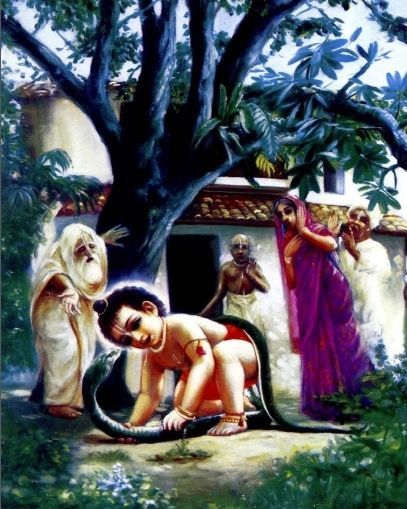
When the Lord was on the lap of His mother, He would at once stop crying as soon as the ladies surrounding Him chanted the holy names and clapped their hands. This peculiar incident was observed by the neighbors with awe and veneration. Sometimes the young girls took pleasure in making the Lord cry and then stopping Him by chanting the holy name. So from His very childhood the Lord began to preach the importance of the holy name. In His early age Lord Śrī Caitanya was known as Nimāi. This name was given by His beloved mother because the Lord took His birth beneath a nimba tree in the courtyard of His paternal house. When the Lord was offered solid food at the age of six months in the anna-prāśana ceremony, the Lord indicated His future activities. At this time it was customary to offer the child both coins and books in order to get some indication of the future tendencies of the child. The Lord was offered on one side coins and on the other the Śrīmad-Bhāgavatam. The Lord accepted the Bhāgavatam instead of the coins. When He was a mere baby crawling in the yard, one day a snake appeared before Him, and the Lord began to play with it. All the members of the house were struck with fear and awe, but after a little while the snake went away, and the baby was taken away by His mother. Once He was stolen by a thief who intended to steal His ornaments, but the Lord took a pleasure trip on the shoulder of the bewildered thief, who was searching for a solitary place in order to rob the baby. It so happened that the thief, wandering hither and thither, finally arrived just before the house of Jagannātha Miśra and, being afraid of being caught, dropped the baby at once. Of course the anxious parents and relatives were glad to see the lost child. https://sites.google.com/view/grantha-raja-srimad-bhagavatam/canto-1-creation/plate-1-intro-a-snake-appeared-before-the-baby Shri Krishna Chaitanya Prabhu Nityananda Shri Advaita Gadadhara Srivasa adi Gaura Bhakta Vrnda Hare Krishna Hare Krishna Krishna Krishna Hare Hare Hare Rama Hare Rama Rama Rama Hare Hare https://www.instagram.com/p/CphseJUoCs6/?igshid=NGJjMDIxMWI=
11 notes
·
View notes
Text
8 Most Famous Festivals in India
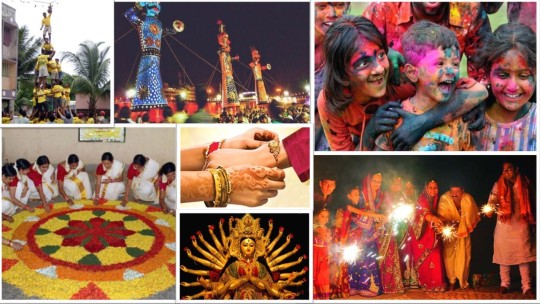
India is known for its multitude of festivals and the peaceful coexistence of people from different religious backgrounds. These festivals are a true representation of India's rich cultural heritage and traditions. There are several festivals and celebrations. While there are celebrations throughout the year, the country is at its most colorful from October to January. Every religion and community in India practice their own culture and enjoy it to the fullest. India celebrates holidays according to state, religion, and society. Festivals in India are never ending and every day is something to celebrate.
Diwali
The nation commemorates Lord Rama's homecoming to Ayodhya after a 14-year exile by lighting diyas, making rangolis, adorning homes, donning new garments, giving out presents, and setting off fireworks. People also revere Lord Ganesha, who represents moral beginnings, and Goddess Lakshmi, the Goddess of riches and prosperity. In West Bengal and Odisha, it is referred to as Kali Puja. It is known as Bandi Chor Diwas in Sikhism, and around this time, worshippers light the Golden Temple of Amritsar and enjoy fireworks displays. All around the nation, Diwali melas are organized. In Karnataka, there is a five-day celebration, which can be witnessed during India tours. In the Braj region, Diwali is devoted to Lord Krishna, and as a result, they worship Govardhan Mountain. There is a lot of fervor and spectacle around the Festival of Lights.
Republic Day
India became a republic on January 26, 1950, when the Indian Constitution went into effect. Since then, Indians have proudly celebrated the national holiday on January 26 each year. The festivities take the form of ceremonial marches at Rajpath in front of the Indian President and other foreign dignitaries. Numerous thousands of people come to the venue to watch the spectacle showcasing the nation's unity and cultural diversity. You need to register for this event from government websites during your India tour packages.
Holi
The festival of colors is the friendliest holiday in the nation. The night before Holi is Holika Dahan, when all negativity is burned in a bonfire. People play with organic colors while grooving to music on the main day. The festival's signature dishes include Gujiya, Mathri, and Thandai. In the Mathura district of Bhaj, Lathmar Holi is observed. Sticks were used by women to amusingly beat their husbands' shields. Offerings are made to Kamadeva, the Hindu god of love, throughout the south. In Gujarat's coastal city of Dwarka, the event is observed at the Dwarkadheesh Temple. It is celebrated as the holiday of reconciliation and fresh starts.
Rath Yatra, Puri, Orissa
The largest celebration observed in Puri is the Rath Yatra. In Puri's primary Jagannath temple, the deities Lord Jagannath, Lord Balabhadra, and Goddess Subhadra are carried away on the heavenly wheel and placed in their corresponding chariots. The chariots are then driven up to the Gundicha Temple's grand avenue. Participants in this Yatra number in the thousands. This Yatra is also shown live on foreign channels.
Krishna Janmashtami
The birth of Lord Krishna is commemorated each year by a Hindu event. The holiday is observed differently in each state. The traditional Krishna play, Rasa Lila, is performed throughout the states of Gujarat, Manipur, Assam, Rajasthan, and Mathura. The Dahi Handi festival is held in Mumbai, Pune, and Gujarat, during which groups construct human pyramids to reach a yogurt pot that is suspended at a specific height. In Gujarat, traditional dances are presented at the temples. Farmers in Gujarat's Kutch region paint bullock carriages with Krishna statues to perform pageants. People participate in devotional songs and celebrate the holiday in North East and South India, respectively. The most important Indian festivals are observed in Mathura, Vrindavan, and ISKCON.
Durga Pooja
The festival honors Goddess Durga's victory over Mahishasura and the triumph of good over evil. In the eastern and north-eastern states of India, it is celebrated over a period of ten days and is a significant social occasion. The believers take pleasure in the lengthy and intricate procedures. You are surrounded by colorful streets, pandals, bhajans, and dazzling lights throughout the festival season. Additionally, to commemorate Maa Durga's victory over the buffalo demon, actual animal sacrifices are made at the temples of West Bengal, Odisha, and Assam. In Karnataka, it is known as Mysore Dasara. The scheduled dates could change.
Rann Utsav, Kutch, Gujrat
Visitors are cordially welcomed in the White Desert. The celebration continues until February. The vibrant fairs at the river's edge enhance people's spirits with a festive spirit. There are activities like horseback riding, camel riding, bird watching, traditional dances, various games, giant chess, paramotoring, and net cricket, to name a few. The festivals in India offer guests an opportunity to get a taste of the many customs and friendliness of the Kutchi people. Everyone enjoys looking at white sand that has colorful ornaments.
Hornbill Festival, Nagaland
The Hornbill Festival, often known as the Festival of Festivals, takes place annually from December 1–7. a distinctive traditional event that takes place in Nagaland, a state in northeastern India. Nagaland is a multiethnic state that is home to various tribes. The state tourism and arts & culture agencies of Nagaland organize the Hornbill Festival to highlight the culture and ethnicity of the region and to promote interaction between various tribal tribes.
Conclusion
India's festivals are a vibrant tapestry of cultural diversity, reflecting the nation's rich heritage. From the dazzling lights of Diwali to the colors of Holi and the grandeur of Republic Day, these celebrations are a testament to India's unity in diversity. The Rath Yatra in Puri, Krishna Janmashtami's joyous festivities, and the grandeur of Durga Puja in the east showcase the country's deep-rooted traditions.
As you plan your journey through India, don't miss these opportunities to immerse yourself in the country's cultural tapestry. Each festival paints a unique picture of India's traditions, making your visit to places in India like Delhi, Kolkata, Mathura, and Nagaland an unforgettable experience.
3 notes
·
View notes
Text
Adi Kabi Sarala Das
Adi Kabi Sarala Dasa
Sarala Dasa (born as Siddheswara Parida) was a 15th-century poet and scholar of Odia literature. Best known for three Odia books — Mahabharata, Vilanka Ramayana and Chandi Purana — he was the first scholar to write in Odia and his revered as the Adi Kabi (First Poet) of Odia literature. As an originator of Odia literature, his work has formed an enduring source of information for succeeding generations.
HERE SARALADAS BOOK AVAILABLE
Life-- The early life of Sarala Dasa is not accurately known. He was a contemporary of the Gajapati King Kapilendra Dev. Though the date of his birth cannot be accurately determined, he can safely be placed to the 15th century AD. He was born at a village called kanakavati patana known as Kanakapura at the Tentuliapada, Jagatsinghpur district.Sarala Dasa had no organized early education, and what he achieved through self-education was attributed to the grace of Sarala, goddess of devotion and inspiration. Though his early name was Siddheswara Parida, he was later known as Sarala Dasa, or 'by the boon of Sarala'. (The title Dasa means a slave or a servant of a particular god or goddess. A long list of poets, preceding and succeeding Sarala Dasa, have names ending this way. For example: Vatra Dasa, Markanda Dasa, Sarala Dasa, Jagannatha Dasa, Balarama Dasa, and Yasovanta Dasa.) A story – similar to those told of other Indian poets, . such as Kalidasa, supposedly illiterate in early life until helped by the goddess Saraswati – tells that Siddheswara as a boy was once ploughing his father's field and singing so melodiously that the goddess Sarala stopped and listened to his song and endowed him with her power of composing beautiful poems.
There are several indications in his Mahabharata that he served as a soldier in the army of the Gajapati King of Odisha.
Works--
As well as the three books for which he is best known – Mahabharata, Vilanka Ramayana and Chandi Purana - Sarala Dasa also wrote the book Laxmi Narayana Vachanika. The Adi Parva Mahabharata opens with a long invocation addressed to the Lord Jagannatha of Puri, from which it is known that Sarala Dasa started writing his Mahabharata in the reign of Kapileswar, otherwise known as Kapilendra Deva, the famous Gajapati king of Odisha (AD 1435–67). He tells us that Maharaja Kapilesvara with innumerable offerings and many a salute was serving this great deity and hereby destroying the sins of the Kali age.
Though Sarala Dasa followed the main outline of the Sanskrit Mahabharata in writing the Odia Mahabharata, he made numerous deviations and added to it copiously the stories of his own creation and various other matters known to him. In the final form Sarala Dasa's Mahabharata is a new creation analogous to Kalidasa's Raghuvamsa based on the Ramayana.
Mahabharata brought to light about the 18 parvas. The Chandi Purana was based on the well-known story of Goddess Durga killing Mahishasura (the buffalo headed demon) given in Sanskrit literature but here also the Odia poet chose to deviate from the original at several points. His earliest work, Vilanka Ramayana, was a story of the fight between Rama and Shahasrasira Ravana (thousand headed Ravana).
He wrote the poems in Dandi chand (in which chand the number of letters in the verses is not fixed is called as dandi chand). The verse of Sarala Dasa is simple, forceful and musical, without artificiality. Applying colloquial words for his poetical purpose, his writing was free from Sanskritisation. His work can be seen as adapting the popular oral conventions of earlier Odia folk songs which were used in folk dances such as the Ghoda-nacha (Horse Dance), Dandanacha and Sakhinacha (Puppet Dance). One metrical peculiarity of these songs is that both the lines of a verse do not contain an equal number of letters though the last letters of both the lines produce the same sound. All Sarala Dasa's wors were composed with this metrical peculiarity, and so the metre used by him can be regarded as a direct descendant of that used in the folk songs. By the fifteenth century the Odia language had assumed almost its modern form and had become ripe for literary compositions.
The predominant sentiment in Sarala Dasa's poem is not love but war. He was also motivated by a strong religious zeal to compose religious books in a language intelligible to all and to make them available to the general public in Odisha. He tells in no uncertain words that he composed his poems for the benefit of "human beings". There are several indications in his Mahabharata that he served as a soldier in the army of the Gajapati King of Odisha and his association with the army brought to him a variety of experiences. The stories he heard the battle scenes which he witnessed, the places that he visited with the company of the army the historical incidents and names that he could know all remained stored up in his mind to be utilized in his writings.
3 notes
·
View notes
Text
Reason & History of celebration
New Year’s Day Thailand use both Western year and traditional Thai year, which is 43 years ahead of its Western equivalent
Children’s Day This day is use to recognise the development that children have made and will make to the future of the country. These days it's all about children having fun and parents being grateful for the part they play in bonding families and enriching lives.
Teachers’ Day Thailand hold a belief that teachers are some of society's most valuable contributors to shape the children, who will be the future of the country. Thai people believe teachers deserve to be recognized and appreciated for their dedication
Chinese Lunar New Year 11-14% of Thailand's population are considered ethnic Chinese
Valentine
Makha Bucha Day ”to mark a significant gathering where Lord Buddha led his teaching upon 1,250 of his first disciples” is an explanation from pattaya.holidayinn.com https://shorturl.at/bpyGZ
National Thai Elephant Day promotes awareness about protecting and conserving the Thai elephant population and its habitats.
National Muay Thai Day The fighting style is thought to have been used by soldiers and also by locals protecting their lands. Long before it was a sport, Muay Thai was an important survival tool.
Chakri Day This day is for citizens to honor the royal family and celebrate their contributions to the country
Thai New Year Songkran was the official New Year until 1888, when it was switched to a fixed date of 1 April. Then in 1940, this date was shifted to 1 January. The traditional Thai New Year Songkran was transformed into a national holiday.
Labour Day This holiday has roots in the labour union movement and in the struggle for workers rights internationally
Coronation Day The day is use to demonstrates the stability and unity of the people as the Nation
Bung Ban Fai Rocket Festival Fertility rituals which were held to celebrate the coming of the monsoon season, which rain for the first few month
Visakha Bucha Day marking the birth, enlightenment and death of the Lord Buddha
Phi Ta Khon Ghost Festival This day is believe that dead would come back to life
Khao Phansa (Start of ‘Buddhist Lent’) Mark the start of the three-month period during the rainy season when monks are required to remain in a particular place such as a monastery or temple grounds. There, they will meditate, pray, study, and teach other young monks.
Asahna Bucha Day traditionally a popular day for young Thai men to enter the monkhood
Mother’s Day Commemorate the birthday of Her Majesty Queen Sirikit.
Por Tor Hungry Ghost Festival To pay respect to the dead.
Vegetarian Festival Those who participate would turn vegan for nine days. The local Chinese community believe that abstinence from meat and other negative stimulants will lead to good health and peace of mind.
Thai National Flag Day To commemorate the day the tricolor flag was issued as the current national flag by King Rama VI Fun fact: Thai flag used to be white elephant face the left with red background, but the flag is often place in the wrong direction, so the King Rama VI notice the flaw in the flag change it to tri color representing: national, religion and king as seen today
King Bhumibol Adulyadej Memorial Day King Bhumibol Adulyadej or Rama IX is a beloved king in Thailand and was praised for his handwork to improve the quality of life for every citizen in Thailand. He would personally travel to the rural or country side area to see the quality of peoples’ live in those area.
Awk Phansa (End of ‘Buddhist Lent’)
Chulalongkorn Day Celebrates the life and work of King Chulalongkorn, also known as Rama V, who ruled Thailand for 42 years
Sat Thai Festival Honoring spirits of the season and dead relatives. Rites and ceremonies vary among different communities. The ceremony is sometimes referred to by locals as “sending off grandparents into the next life”, and is an activity that boosts community unity. Context: Thailand are mostly Buddhism, which believe that everything would be rebirth as one form or another such as animal could be rebirth as a human.
Loy Krathong Paid respects to the water spirits
Yi Peng Lantern Festival a way to release negative energy and wish for good luck and good fortune in the coming year.
Father’s Day Commemorate the birthday of King Rama IX.
Constitution Day commemorates Thailand's adoption of a constitutional monarchy in 1932
Christmas Day Over 90% of the Thai population are Buddhist. Buddhism is tolerant of all other religions, including Christianity, and this religious tolerance is part of the reason why a major Christian festival such as Christmas can also be enjoyed by Buddhists in Thailand.
2 notes
·
View notes